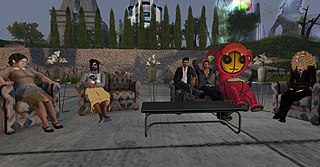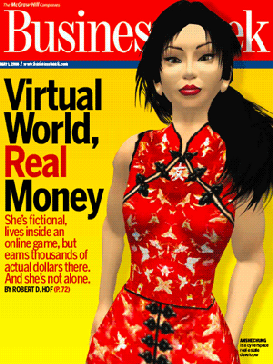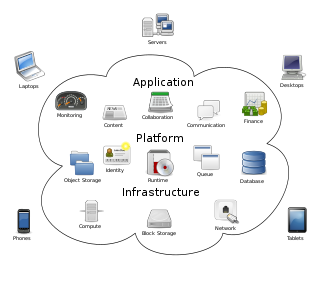A massively multiplayer online role-playing game (MMORPG) is a video game that combines aspects of a role-playing video game and a massively multiplayer online game.

Virtual reality (VR) is a simulated experience that employs pose tracking and 3D near-eye displays to give the user an immersive feel of a virtual world. Applications of virtual reality include entertainment, education and business. Other distinct types of VR-style technology include augmented reality and mixed reality, sometimes referred to as extended reality or XR, although definitions are currently changing due to the nascence of the industry.
A virtual community is a social work of individuals who connect through specific social media, potentially crossing geographical and political boundaries in order to pursue mutual interests or goals. Some of the most pervasive virtual communities are online communities operating under social networking services.
A virtual economy is an emergent economy existing in a virtual world, usually exchanging virtual goods in the context of an online game, particularly in massively multiplayer online games (MMOs). People enter these virtual economies for recreation and entertainment rather than necessity, which means that virtual economies lack the aspects of a real economy that are not considered to be "fun". However, some people do interact with virtual economies for "real" economic benefit.

Citrix Systems, Inc. is an American multinational cloud computing and virtualization technology company that provides server, application and desktop virtualization, networking, software as a service (SaaS), and cloud computing technologies. Citrix products were claimed to be in use by over 400,000 clients worldwide, including 99% of the Fortune 100, and 98% of the Fortune 500.

VMware LLC is an American cloud computing and virtualization technology company with headquarters in Palo Alto, California. VMware was the first commercially successful company to virtualize the x86 architecture.

Second Life is an online multimedia platform that allows people to create an avatar for themselves and then interact with other users and user-created content within a multi-user online virtual world. Developed and owned by the San Francisco–based firm Linden Lab and launched on June 23, 2003, it saw rapid growth for some years and in 2013 it had approximately one million regular users. Growth eventually stabilized, and by the end of 2017 the active user count had declined to "between 800,000 and 900,000". In many ways, Second Life is similar to massively multiplayer online role-playing games; nevertheless, Linden Lab is emphatic that their creation is not a game: "There is no manufactured conflict, no set objective".

A virtual world is a computer-simulated environment which may be populated by many users who can create a personal avatar, and simultaneously and independently explore the virtual world, participate in its activities and communicate with others. These avatars can be textual, graphical representations, or live video avatars with auditory and touch sensations. Virtual worlds are closely related to mirror worlds.

The metaverse is a loosely defined term referring to three-dimensional virtual worlds in which users represented by avatars interact.

Anshe Chung is an avatar of Ailin Graef in the online world Second Life. Referred to as the "Rockefeller of Second Life" by CNN, Graef has built an online business that engages in development, brokerage, and arbitrage of virtual land, items, and currencies. Her work has been discussed in Business Week, Fortune and Red Herring.
The virtual world Second Life has its own economy and a virtual token referred to as Linden Dollars (L$). In the SL economy, users buy from and sell to one another directly, using the Linden, which is a closed-loop virtual token for use only within the Second Life platform. Linden Dollars have no monetary value and are not redeemable for monetary value from Linden Lab. However, the presence of a currency exchange has led to the Linden Dollar being recognised as a centralized virtual currency, a fiat currency, or property. A resident with a surplus of Linden Dollars earned via a Second Life business or experiential play can offer to exchange with other users via the LindeX exchange provided by Linden Lab. This economy is independent of the price of the game, which users pay to Linden Lab, not to each other. Linden Lab reports that the Second Life economy generated US$3,596,674 in economic activity during the month of September 2005, and in September 2006 Second Life was reported to have a GDP of US$64,000,000.
Open Wonderland is an open-source toolkit written in Java for creating collaborative 3D virtual worlds. Within those worlds, users can communicate with high-fidelity, immersive audio, share live desktop applications and documents and conduct real business. Open Wonderland is completely extensible; developers and graphic artists can extend its functionality to create entirely new worlds including adding new features to existing worlds.
In computing, virtualization or virtualisation is the act of creating a virtual version of something at the same abstraction level, including virtual computer hardware platforms, storage devices, and computer network resources.
Roblox is a 2006 online game platform and game creation system developed by Roblox Corporation that allows users to program games and play games created by other users. Created by David Baszucki and Erik Cassel in 2004 and released in 2006, the platform hosts user-created games of multiple genres coded in the programming language Lua. For most of Roblox's history, it was relatively small, both as a platform and as a company. Roblox began to grow rapidly in the second half of the 2010s, and this growth has been accelerated by the COVID-19 pandemic.

Terra Nova was a collaborative blog for academics and professionals in game studies. It focused primarily on the study of virtual worlds.

A virtual assistant (VA) is a software agent that can perform a range of tasks or services for a user based on user input such as commands or questions, including verbal ones. Such technologies often incorporate chatbot capabilities to simulate human conversation, such as via online chat, to facilitate interaction with their users. The interaction may be via text, graphical interface, or voice - as some virtual assistants are able to interpret human speech and respond via synthesized voices.
Virtual goods are non-physical objects and money purchased for use in online communities or online games. Digital goods, on the other hand, may be a broader category including digital books, music, and movies. Virtual goods are intangible by definition.

Cloud computing is the on-demand availability of computer system resources, especially data storage and computing power, without direct active management by the user. Large clouds often have functions distributed over multiple locations, each of which is a data center. Cloud computing relies on sharing of resources to achieve coherence and typically uses a pay-as-you-go model, which can help in reducing capital expenses but may also lead to unexpected operating expenses for users.

Vagrant is a source-available software product for building and maintaining portable virtual software development environments; e.g., for VirtualBox, KVM, Hyper-V, Docker containers, VMware, Parallels, and AWS. It tries to simplify the software configuration management of virtualization in order to increase development productivity. Vagrant is written in the Ruby language, but its ecosystem supports development in a few other languages. Vagrant has a Business Source License 1.1, while there is a fork called Viagrunts with the original MIT license.

HP Cloud was a set of cloud computing services available from Hewlett-Packard that offered public cloud, private cloud, hybrid cloud, managed private cloud, and other cloud services. It was the combination of the previous HP Converged Cloud business unit and HP Cloud Services, an OpenStack-based public cloud. It was marketed to enterprise organizations to combine public cloud services with internal IT resources to create hybrid clouds, or a mix of private and public cloud environments, from around 2011 to 2016.










